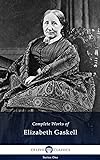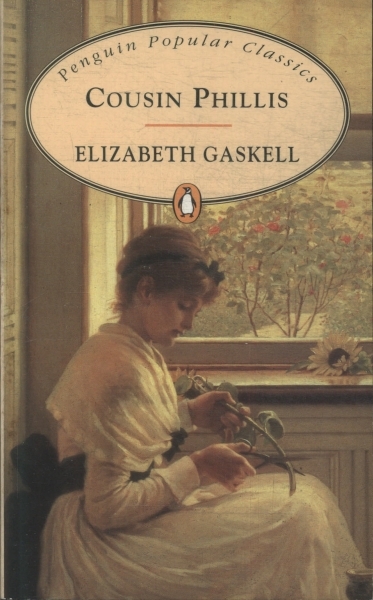This year, Bill (The Australian Legend) has framed his usual January “Gen” (short for generation) week, as Gen 0. Zero? How can that be? Well, let’s get it from the horse’s mouth. Bill says, “I am using ‘Gen 0’ as a designation for those writers – necessarily not Australian – whose work influenced, predated or paralleled the first wave feminists of AWW Gen 1”. In other words, we are looking at mostly 19th century writers – like Charlotte Bronte, Elizabeth Gaskell, and Charlotte Perkins Gilman.
Bill’s list is just a start. I would add Kate Chopin in there too, but more discussion and expansion of Bill’s list will presumably happen over the week, so I’ll get on to Mrs – or Elizabeth – Gaskell.
My Gaskell journey started in my teens when my mother, seeing my enthusiasm for Jane Austen, suggested I read Mrs (as she was on the book) Gaskell’s Cranford. From there I read North and south, Wives and daughters, and Ruth – all before blogging. I had hoped to read her first novel, Mary Barton, for this week, but when I saw how tight my reading schedule was this month, I decided to go for a novella (in the end, two novellas) instead. As it turned out, Bill has already posted on one of them, Cousin Phillis.
The Independent Woman
Bill’s AWW Gen weeks, which started back in 2018, draw from his thesis that “a case can be made for a parallel myth” to that of historian Russell Ward’s male-dominated Lone Hand. It features “the Independent Woman, who makes her way without, and often despite, men”. He is talking Australian women, of course, but for Gen 0 we are looking at what was happening elsewhere that may have affected, or simply parallel, what was happening in Australia. Elizabeth Gaskell is a perfect example, because, despite being a wife and mother of four daughters, she managed to forge a career for herself as a writer of novels, short stories, and biography.
She could do this for a few reasons, including the fact that the church she belonged to, and married into, was the dissenting, non-conformist Unitarian church, and that her minister husband William Gaskell was himself a writer and poet. He was also, according to Wikipedia, “a charity worker and pioneer in education of the working class”. It’s no surprise, then, that Gaskell’s themes, as Bill succinctly puts in it his post on Cousin Phillis, encompassed “dissenting religion and the plight of the poor, as well as strong women characters”, are all important themes in her work.”
Her fiction falls broadly into to main strands – the “ghost” stories, and the “social novel“. It is into the latter that Lizzie Leigh and Cousin Phillis fall.
Lizzie Leigh
Lizzie Leigh, published in 1855, is the simpler, shorter, of the two novellas, and its themes remind me of the 1853-published Ruth. It starts with the death of the “hard, stern, and inflexible” husband and father, James Leigh, who says to his wife on his deathbed “‘I forgive her, Anne! May God forgive me!’” We soon learn that the “her” being forgiven is their fallen daughter “Lizzie” whom he’d disinherited.
With her husband gone, Anne decides to rent out the farm for a year and go to Manchester with her two sons, the 21-year-old responsible Will who sees things his father’s way and the much younger Tom. She wants to find Lizzie.
The rest of the novella concerns her search for Lizzie, and the difference of opinion between her idea of religion – a forgiving, New Testament-based one – and Will’s. He is prepared to support his mother, for a year anyhow, but he believes Lizzie is dead and, further, that her sin brings shame on the family. When he meets an angelic young woman, he’s convinced that her knowing about Lizzie will spoil his chances with her. But things are not as he sees them, and his mother, who had been a submissive wife, starts to express her own beliefs, and commands him to listen to her on tolerance and forgiveness:
She stood, no longer, as the meek, imploring, gentle mother, but firm and dignified, as if the interpreter of God’s will.
So, two independent women here – Gaskell the writer and Anne Leigh the character.
Cousin Phillis
This novella, originally serialised in The Cornell Magazine (1863-64), is briefly introduced in my Delphi edition with “many critics agree that Cousin Phillis is Gaskell’s crowning achievement in short fiction”. It is a longer, somewhat more complex tale, and is, essentially, a coming-of-age story in which 19-year-old Paul, and his 17-year-old second cousin, Phillis – both only children – learn some tough lessons.
The story is told first person by Paul, who speaks from later in his life about when, as a young man, he had obtained a job in a country town working to an engineer in a railway building company. He begins visiting some previously unknown relations, the aforementioned Phillis and her Nonconformist clergyman-farmer father and plain-thinking mother. You might be expecting a romance to develop between these two, but quite early on Paul decides that Phillis is not for him. Not only is she still, strangely, wearing a childish pinafore, but she is taller and, like her father, bookish, which makes him feel inferior. This will not do, so they quickly fall into a sibling-like relationship, and Paul slots comfortably into their lives whenever he can. Well and good.
However, there is another man in the story, Paul’s supervisor, Mr Holdsworth, whom he hero-worships. Paul describes him as “really a fine fellow in a good number of ways”, adding that “I might have fallen into much worse hands”, which of course makes us wonder whether this is an ironic hint. As it turns out, yes and no. Heartbreak does ensure, and Paul, with well-intentioned naïveté, plays a role in bringing this about. But, he should not shoulder the full blame because we, like guilt-ridden Paul and sensible servant Betty, have seen how much her parents have babied Phillis: ‘”the child” is always their name for her when they talk on her between themselves’, says Betty.
Most of the action takes place on Phillis’ family farm, with Gaskell beautifully rendering rural life, while also introducing readers to the increasing industrialisation, bringing hints of the social change she portrayed with more depth in North and south‘s exploration of rural tradition versus modern values.
Gaskell also conveys some of her progressive views on religion. Early on, Mr Holdsworth asks Paul about his cousins:
How do preaching and farming seem to get on together? If the minister turns out to be practical as well as reverend, I shall begin to respect him.
Towards the end of the story, when Phillis is critically ill, her father is visited by some local ministers who preach their punitive religion to him, suggesting he consider “what sins” had brought this trial upon him, and
whether you may not have been too much given up to your farm and your cattle; whether this world’s learning has not puffed you up to vain conceit and neglect of the things of God; whether you have not made an idol of your daughter?’
Our minister will have none of it. He will confess his sins to God, but, he says
‘I hold with Christ that afflictions are not sent by God in wrath as penalties for sin.’
‘Is that orthodox, Brother Robinson?’ asked the third minister, in a deferential tone of inquiry.
The ending, while not tragic, is open, which works well for me, though according to Wikipedia, she had considered adding two more parts to this four-part story. All up, another good read from the independent Mrs Gaskell!
Elizabeth Gaskell
Lizzie Leigh (1855) and Cousin Phillis (1864, available online)
in Complete works of Elizabeth Gaskell (illustrated)
Hastings (UK): Delphi Classics, 2015 (Version 5)


Pingback: Mrs Gaskell, two novellas | The Australian Legend
Thank you for taking part. Thank you for taking the trouble to so clearly explain my objectives. Now having read your reviews, especially of Lizzie Leigh, which I haven’t come across before, I am going to have to revise my own upcoming review of Ruth to better fit it into the themes of the Week.
I find I am quite comfortable with ‘non comformist’ christianity (Gaskell was a Unitarian), and am quite easily able to suspend my disbelief when, for instance, dying girls are offered a clear path to ‘heaven’.
Thanks Bill … yes, I did say she was Unitarian – in too many words. I remember Ruth and having such mixed feelings about it because of the religion, despite her presenting progressive views. Lizzie Leigh is probably available on Gutenberg. I forgot to check.
I understand your suspension of disbelief.
Lizzie Leigh is on Proj Gutenberg. I have the ‘Complete’ Novels’ on kindle, but not the novellas.
I have complete everything on the kindle… including short stories.
Whatever I’ve read of Gaskell was largely confined to the-years-of-unreliable-logging. Hehe It was inspired, I believe, by a mini-series of some sort, probably on English TV. Perhaps of Wives and Daughters? Or North and South? And, then, later I have her biography of Charlotte Bronte logged, which I also really enjoyed (but I was in a Bronte phase at the time, so primed for it really). I have the idea I’d enjoy her from start-to-stop.
Those two are her most famous but she’s a very interesting person for her time as well as good to read.
LOL Could it be that BBC series of North and South with the irresistible Richard Armytage?
Hah! That was likely part of it, back in 2004 apparently, but I think it started with the 1999 W&D. She had a bit of a moment there didn’t she. (One of many, over the decades I s’pose.)
I remember that Wives and daughters too Marcie. Though had read them both before that, and Ruth later.
Pingback: Mrs Gaskell & Me & the Independent Woman | The Australian Legend
I found Lizzie Leigh online at the Placentia public library! I was a bit shocked because I thought it would be difficult to obtain. I just finished reading it. Yes—-the mother’s attitude of forgiveness and mercy prevailed, but what a sad story.
Oh, I’m so glad you sussed it out Carolyn … it is a sad story (but typical of that period wouldn’t you say?) and there’s hope too of lessons learnt?
Calling a grown woman. A child reminds me so much of Daphne du Maurier’s novel Rebecca. In that novel, her husband Maxim and Maxim’s sister Beatrice both refer to her as the child. Part of it may be that she never has a name revealed to us, but it certainly does make her sound infantile. We know what happens in the end of the book because it’s revealed to us in the beginning of the book. “The child” basically takes care of Maxim, and he becomes more like a child.
Oh, interesting pick up Melanie – I never would have thought of that connection.
Thank you for the prompt to read more Gaskell. I read N&S in 2015 and have been meaning to read more ever since.
You can add her to your Classics Spin Brona!
🙂